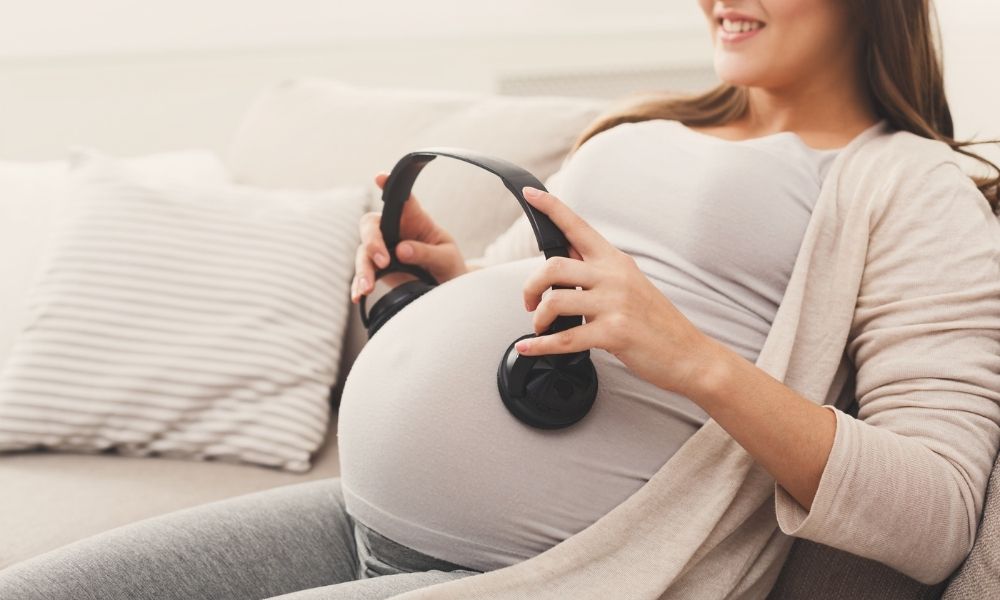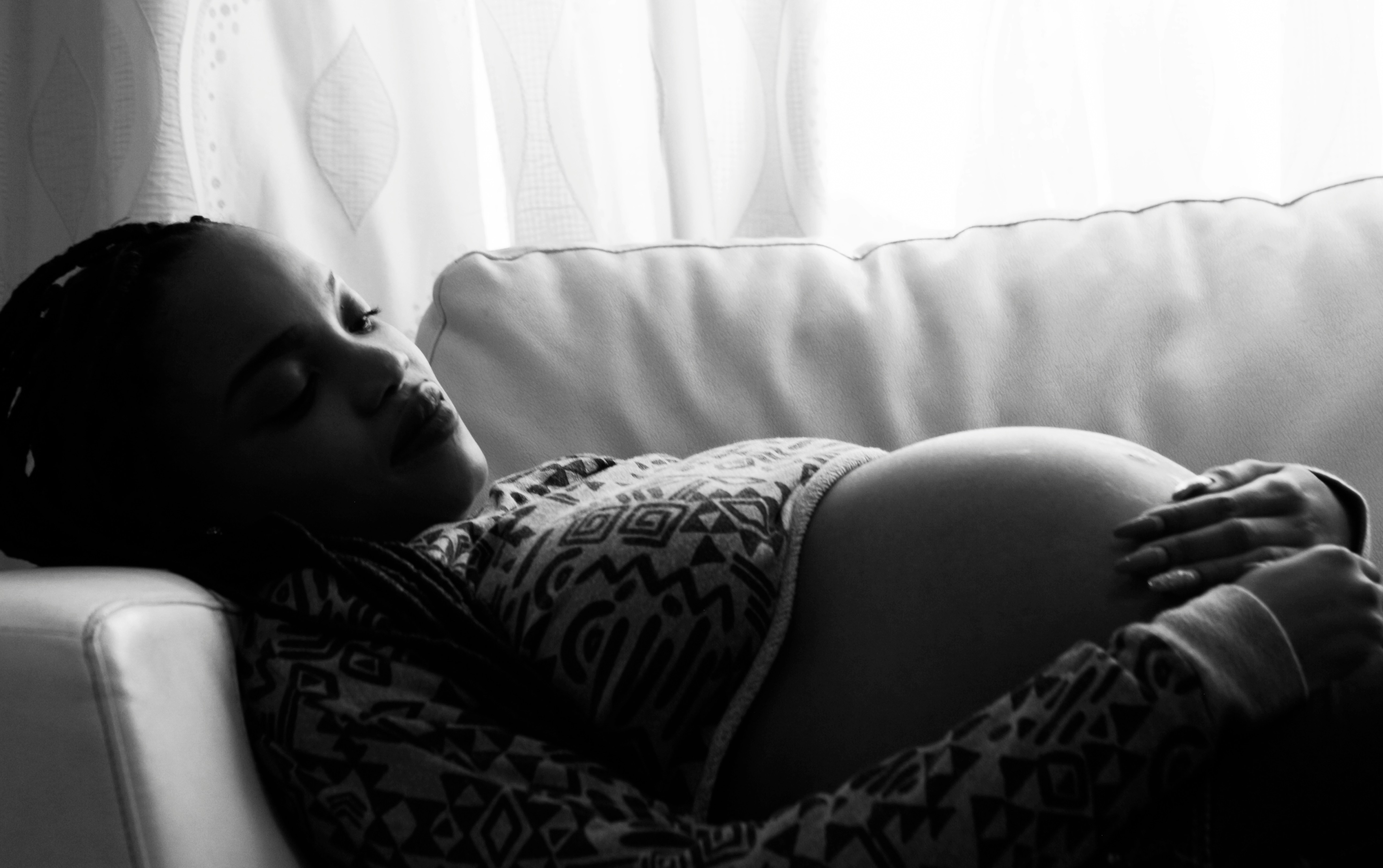The most generally quoted symptoms leading to the diagnosis of HG include near constant nausea and frequent vomiting that is affecting your ability to function normally, weight-loss of more than 5%, dehydration, and malnutrition.
What we do know about the causes of HG is that for many women there is a strong genetic element (women whose mother or sister suffered are more likely to get it themselves) and that it is not a psychological condition. Nothing you do or don’t do will cause HG to occur and it is not your fault that you are experiencing it.
What are the symptoms of HG?
In addition to the symptoms described above, HG typically presents itself with severe and persistent nausea and/or vomiting, leading to weakness and exhaustion. Some women vomit multiple times every day, others may vomit less frequently but suffer from nausea and dry retching that affects their ability to function. If nausea and/or vomiting is so severe that it affects your ability to carry out normal tasks such as eating, drinking, personal hygiene, or your ability to work or care for older children then it is worth contacting your GP or midwife.
In addition to feeling and being sick women with HG also can experience headaches, a very heightened and warped sense of smell, excessive saliva which is difficult to swallow, constipation and a number of other symptoms.
What are the risks associated with HG?
Since the introduction of IV hydration, HG is rarely the life-threatening illness it once was. However prolonged dehydration and malnutrition can lead to various health risks including vitamin deficiencies and electrolyte imbalances which need to be monitored and managed.
While recent research has shown that if HG is not effectively managed there may be increased risks to the baby, such as small for gestational weight gain and pre-term birth, it is important to remember that if treatment is sought and symptoms brought under control the risks to the baby are very low.
Increasingly research is showing that it is the malnutrition in early pregnancy that leads to complications, rather than the actual nausea and vomiting, so it’s important to seek help if sickness is stopping you eating.
What treatment options are available?
If a woman is becoming dehydrated because she cannot keep fluid down then it is important that she receive Intravenous fluid replacement (a drip). This is usually done in hospital but increasingly areas are offering outpatient rehydration which allows women to receive fluids during the day and return home at night.
There are a number of anti-sickness drugs which are used to treat NVP and HG. One, called Xonvea, is licensed in the UK. If that doesn’t work though there are lots of others which are not licensed for use in pregnancy but have been used for many years and no harmful effects for the baby have been found.
Many women can feel guilty about taking medication in pregnancy as there are long held beliefs that drugs should be avoided and may harm the baby but with a serious condition such as HG it is important to remember that NOT treating symptoms effectively can carry risk and many thousands of pregnant women have taken medication without harm to the baby.
Unfortunately many women suffering from HG encounter healthcare providers with limited knowledge or experience of treating HG and who may misdiagnose the symptoms as normal. This is often exacerbated by the difficulty in describing the severity of symptoms in a clear way, and so it can be helpful to keep a thorough record of symptoms.
Can alternative therapies help?
While many women who experience regular “morning sickness” may find that Complementary and Alternative Medicines (CAM) may help with symptom management, for women with HG it is important that conventional treatment is not delayed by exploration of CAM. The national helpline run by Pregnancy Sickness Support speak to hundreds of women every year with hyperemesis, Karen Lodge, who answers the helpline says “Almost everyone I speak to has already tried ginger, acupressure, aromatherapy and the various other self-help techniques available before they even visit their GP or see their midwife. Information about self-help and CAM options are widely available and therefore healthcare professionals can confidently assume that women already know about them”. While there has been some evidence for ginger to ease nausea and vomiting a recent large scale survey of women’s experience of ginger for HG found that in 50% of women it actually made symptoms worse and cause pain and discomfort. Furthermore, they found that when healthcare professionals suggested it to women who had a diagnosis of HG it had a profoundly negative impact on their mental wellbeing.
What are the NICE guidelines for HG?
The NICE guidelines only make recommendations for NVP and include ginger, P6 acupressure and antihistamines for NVP, but make no specific recommendations for HG. However, they do provide a Clinical Knowledge Summary which outlines the various drug therapies which is based on the widely accepted Javis and Nelson-Pericy Paper.
The NICE guidelines specifically states:
“Women, their partners and their families should always be treated with kindness, respect and dignity. The views, beliefs and values of the woman, her partner and her family in relation to her care and that of her baby should be sought and respected at all times.
“Women should have the opportunity to make informed decisions about their care and treatment, in partnership with their healthcare professionals […]Good communication between healthcare professionals and women is essential. It should be supported by evidence-based, written information tailored to the woman’s needs […] Every opportunity should be taken to provide the woman and her partner or other relevant family members with the information and support they need.”
What other support can be offered to women?
The UK charity Pregnancy Sickness Support (PSS) has a helpline and webchat which is open Monday to Friday 9am-4.30pm and can offer information and support to women, their partners or family members. The charity also has a 1-2-1 support network of volunteers whom you can be matched with for support as well as a website forum for 24/7 support online.
For posters, leaflets and other display materials for your clinical area please contact the charity via the helpline or website.
References
1. Einarson TR, Piwko C, Koren G Quantifying the global rates of nausea and vomiting of pregnancy: a meta analysis, J Popul Ther Clin Pharmacol. 2013, 20, (2), e171-83.
2. Dean C, Gadsby R Severe Nausea and Vomiting in Pregnancy, Nursing in Practice. 2013, March/April, 2.
3. MacGibbon K, Fejzo M, Mullin P Mortality Secondary to Hyperemesis Gravidarum: A Case Report, Women’s Health & Gynecology. 2015, 1, (2), 7.
4. Dean C, Murphy C I could not survive another day: Improving treatment and tackling stigma: lessons from women’s experiences of abortion for severe pregnancy sickness. (Pregnancy Sickness Support and Service, B. P. A. (eds.)). 2015.
5. Bolin M, Akerud H, Cnattingius S, Stephansson O, Wikstrom A Hyperemesis gravidarum and risks of placental dysfunction disorders: a population-based cohort study, Bjog-an International Journal of Obstetrics and Gynaecology. 2013.
6. Mullin PM, Bray A, Schoenberg F, MacGibbon KW, Romero R, Goodwin TM, et al. Prenatal exposure to hyperemesis gravidarum linked to increased risk of psychological and behavioral disorders in adulthood, Journal of Developmental Origins of Health and Disease. 2011, 2, (4), 200-04.
7. Grooten IJ, Painter RC, Pontesilli M, van der Post JA, Mol BW, van Eijsden M, et al. Weight loss in pregnancy and cardiometabolic profile in childhood: findings from a longitudinal birth cohort, Bjog-an International Journal of Obstetrics and Gynaecology. 2015, 122, (12), 1664-73.
8. Swallow BL Nausea and Vomiting in Pregnancy: Psychological and Social Aspects.). Lincoln: University of Lincoln, 2009.
9. Christodoulou-Smith J, Gold JI, Romero R, Goodwin TM, MacGibbon KW, Mullin PM, et al. Posttraumatic stress symptoms following pregnancy complicated by hyperemesis gravidarum, Journal of Maternal-Fetal & Neonatal Medicine. 2011, 24, (11), 1307-11.
10. Gadsby R, Barnie-Adshead A Nausea and vomiting of pregnancy – A literature review, Pregnancy Sickness Support [online]. 2011.
11. Jarvis S, Nelson-Piercy C Management of nausea and vomiting in pregnancy, British Medical Journal. 2011, 342.
12. Boelig RC, Barton SJ, Saccone G, Kelly AJ, Edwards SJ, Berghella V Interventions for treating hyperemesis gravidarum, Cochrane Database Syst Rev. 2016, 5, CD010607.
13. Dean C Helping women prepare for hyperemesis gravidarum, British Journal of Midwifery. 2014, 22, (12), 847-52 6p.
14. Dean CR, O’Hara ME Ginger is ineffective for hyperemesis gravidarum, and causes harm: an internet based survey of sufferers., MIDIRS Midwifery Digest. 2015, 25, (4), 6.
15. Dean C Does the historical stigma of hyperemesis gravidarum impact healthcare professional’s attitudes and treatment towards women with the condition today? A review of recent literature, MIDIRS Midwifery Digest. 2016, 26, (2), 8.
16. Koren G, Boskovic R, Hard M, Maltepe C, Navioz Y, Einarson A Motherisk-PUQE (pregnancy-unique quantification of emesis and nausea) scoring system for nausea and vomiting of pregnancy, American Journal of Obstetrics and Gynecology. 2002, 186, (5), S228-S31.
17. Dean C A patient experience of hyperemesis gravidarum and how the midwife can support her care, Essentially MIDIRS. 2014, 5, (2), 32-6.
All information we provide is for educational and awareness purposes only. Any concerns should be discussed with your GP, Midwife or Healthcare Professional.
If you’re trying to conceive (TTC), you probably know that there are certain foods and nutrients that become especially important once you’re pregnant. But nutrition plays a vital role even when trying to conceive, much like laying a strong foundation before constructing a house.
Certain nutrients create that foundation by supporting egg and sperm health (yes, nutrition matters for both partners), hormone balance and creating a hospitable environment for a fertilized egg to implant. In fact, studies show that certain nutrients can help increase fertility and improve success rates for both natural conception and fertility treatments.
In other words, nutrition is a key player in the TTC journey, but getting the right nutrients in the right quantities can be tricky. That’s where supplements come in. Just as you’d take a multivitamin to fill in nutritional gaps for optimal health, fertility supplements can give you that extra nutrient boost.
Choosing supplements for your fertility journey
When choosing a supplement to support your fertility journey, look for science-backed, high-quality ingredients. Our editors are careful to select and partner with brands that use ingredients that have been clinically studied to support fertility. Eu Natural® (pronounced you) covers all those bases and more. We love knowing that Eu Natural® products contain zero artificial additives, binders, or fillers and are lab-tested to ensure purity and potency.

When choosing a supplement to support your fertility journey, look for science-backed, high-quality ingredients. Our editors are careful to select and partner with brands that use ingredients that have been clinically studied to support fertility. Eu Natural® (pronounced you) covers all those bases and more. We love knowing that Eu Natural® products contain zero artificial additives, binders, or fillers and are lab-tested to ensure purity and potency.





.jpg)

.png)
.jpg)

%20copy.jpg)


